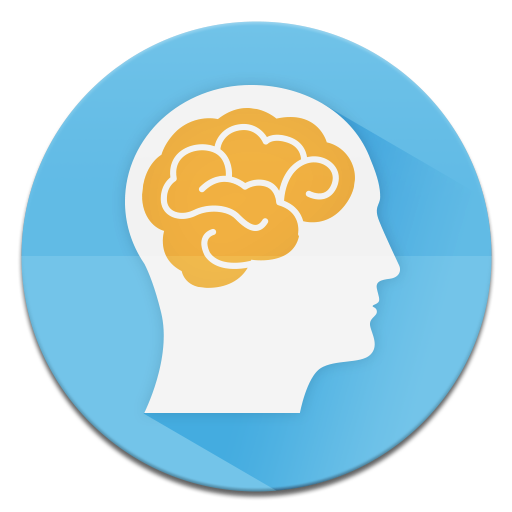

Psychology Interactive Textbook, MCQ & Test Bank
Jouez sur PC avec BlueStacks - la plate-forme de jeu Android, approuvée par + 500M de joueurs.
Page Modifiée le: 20 mars 2018
Play Psychology Interactive Textbook, MCQ & Test Bank on PC
* Complete Textbook by OpenStax
* Multiple Choices Questions (MCQ)
* Essay Questions Flash Cards
* Key-Terms Flash Cards
Powered by QuizOver.com the leading online quiz creator
https://www.quizover.com
Table of Contents
1. Introduction to Psychology
1.1. What Is Psychology?
1.2. History of Psychology
1.3. Contemporary Psychology
1.4. Careers in Psychology
2. Psychological Research
2.1. Why Is Research Important?
2.2. Approaches to Research
2.3. Analyzing Findings
2.4. Ethics
3. Biopsychology
3.1. Human Genetics
3.2. Cells of the Nervous System
3.3. Parts of the Nervous System
3.4. The Brain and Spinal Cord
3.5. The Endocrine System
4. States of Consciousness
4.1. What Is Consciousness?
4.2. Sleep and Why We Sleep
4.3. Stages of Sleep
4.4. Sleep Problems and Disorders
4.5. Substance Use and Abuse
4.6. Other States of Consciousness
5. Sensation and Perception
5.1. Sensation versus Perception
5.2. Waves and Wavelengths
5.3. Vision
5.4. Hearing
5.5. The Other Senses
5.6. Gestalt Principles of Perception
6. Learning
6.1. What Is Learning?
6.2. Classical Conditioning
6.3. Operant Conditioning
6.4. Observational Learning (Modeling)
7. Thinking and Intelligence
7.1. What Is Cognition?
7.2. Language
7.3. Problem Solving
7.4. What Are Intelligence and Creativity?
7.5. Measures of Intelligence
7.6. The Source of Intelligence
8. Memory
8.1. How Memory Functions
8.2. Parts of the Brain Involved with Memory
8.3. Problems with Memory
8.4. Ways to Enhance Memory
9. Lifespan Development
9.1. What Is Lifespan Development?
9.2. Lifespan Theories
9.3. Stages of Development
9.4. Death and Dying
10. Emotion and Motivation
10.1. Motivation
10.2. Hunger and Eating
10.3. Sexual Behavior
10.4. Emotion
11. Personality
11.1. What Is Personality?
11.2. Freud and the Psychodynamic Perspective
11.3. Neo-Freudians: Adler, Erikson, Jung, and Horney
11.4. Learning Approaches
11.5. Humanistic Approaches
11.6. Biological Approaches
11.7. Trait Theorists
11.8. Cultural Understandings of Personality
11.9. Personality Assessment
12. Social Psychology
12.1. What Is Social Psychology?
12.2. Self-presentation
12.3. Attitudes and Persuasion
12.4. Conformity, Compliance, and Obedience
12.5. Prejudice and Discrimination
12.6. Aggression
12.7. Prosocial Behavior
13. Industrial-Organizational Psychology
13.1. What Is Industrial and Organizational Psychology?
13.2. Industrial Psychology: Selecting and Evaluating Employees
13.3. Organizational Psychology: The Social Dimension of Work
13.4. Human Factors Psychology and Workplace Design
14. Stress, Lifestyle, and Health
14.1. What Is Stress?
14.2. Stressors
14.3. Stress and Illness
14.4. Regulation of Stress
14.5. The Pursuit of Happiness
15. Psychological Disorders
15.1. What Are Psychological Disorders?
15.2. Diagnosing and Classifying Psychological Disorders
15.3. Perspectives on Psychological Disorders
15.4. Anxiety Disorders
15.5. Obsessive-Compulsive and Related Disorders
15.6. Posttraumatic Stress Disorder
15.7. Mood Disorders
15.8. Schizophrenia
15.9. Dissociative Disorders
15.10. Personality Disorders
15.11. Disorders in Childhood
16. Therapy and Treatment
16.1. Mental Health Treatment: Past and Present
16.2. Types of Treatment
16.3. Treatment Modalities
16.4. Substance-Related and Addictive Disorders: A Special Case
16.5. The Sociocultural Model and Therapy Utilization
Jouez à Psychology Interactive Textbook, MCQ & Test Bank sur PC. C'est facile de commencer.
-
Téléchargez et installez BlueStacks sur votre PC
-
Connectez-vous à Google pour accéder au Play Store ou faites-le plus tard
-
Recherchez Psychology Interactive Textbook, MCQ & Test Bank dans la barre de recherche dans le coin supérieur droit
-
Cliquez pour installer Psychology Interactive Textbook, MCQ & Test Bank à partir des résultats de la recherche
-
Connectez-vous à Google (si vous avez ignoré l'étape 2) pour installer Psychology Interactive Textbook, MCQ & Test Bank
-
Cliquez sur l'icône Psychology Interactive Textbook, MCQ & Test Bank sur l'écran d'accueil pour commencer à jouer




